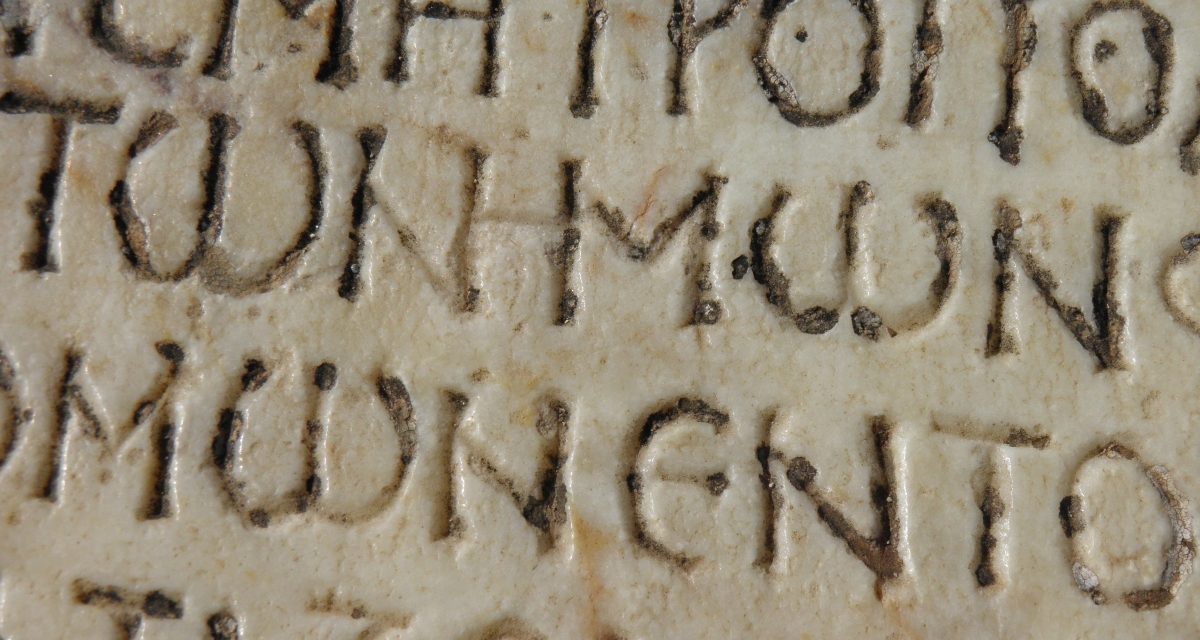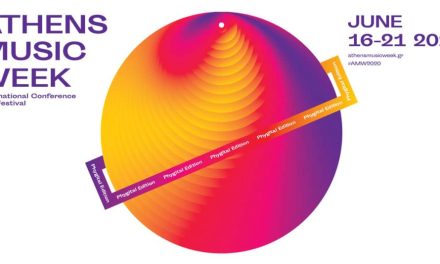Arguably most people realize that words such as democracy, philosophy or tragedy come from Greek, since the very concepts which they represent also have their roots in Greece. And you might also suspect the Greek origins behind some strange and obscure words like anathema, synecdoche or onomatopoeia, as well as long and hard-to-pronounce medical or scientific terms terms such as otorhinolaryngology or trichotillomania.
Yet it might surprise you to find out that a number of words used in everyday conversation –from music and story to idea or plastic– are actually Greek!
Below we will list some of these words and provide their etymology: many among them –perhaps the majority– have come to English through Latin, some have come through French and others directly through Ancient Greek. Finally, many have been coined by English (or other non-Greek) speakers using Greek words to label new concepts and name new objects.
Some of these words do come from a particular background, such as medicine, science or political theory; they are however often used by English speakers without any special knowledge of these fields or particular familiarity with their terminology.
It should also be noted that, although these words have come into other languages from Ancient Greek (Classic, Hellenistic and, rarely, Medieval), they are, almost in their entirety, still used in contemporary Greek, either in their original form or with slight alterations, bearing the same or similar meanings; even those coined by foreign speakers have been reborrowed as semantic loans.
 Prefixes and suffixes
Prefixes and suffixes
Before moving on to full words, let’s start with a few suffixes and prefixes; we are going to repeatedly encounter some of them below, but you can also find them in compound words otherwise unrelated to Greek. We will later also mention suffixes that are particularly related to a specific field.
The omnipresent suffix –logy usually means “the study of” a subject or field e.g., anthropology is the study of humanity, from the Greek anthropos “human being”. It is derived from the word logos “speech” but also “treatise”. Hence, another sense it can take is “a form / type of speech (or writing)”, as in analogy (with the prefix ana– “against” or “re-“), eulogy (from eu “well”), or anthology (from anthos “flower”). The suffix –logue has the same etymology, and usually means a form of speech or writing, but is mostly found in words borrowed from Greek via French, such as catalogue.
Other common suffixes include –philia (and –phile for the adjective); philía is one of the Ancient Greek words for love, which has come to mean friendship in Modern Greek. As a suffix, it signifies a tendency, love or even an obsessive interest for something, e.g., in cinephilia, love of cinema, hydrophilia, attraction to water (from hydor “water”). The opposite is expressed in –phobia, meaning “fear” in Greek, e.g., in acrophobia, fear of heights (from akron “peak, edge”) or photophobia, aversion to light (from phos “light”).
 Some common suffixes include en– and endo– “in, inside”, syn– “and, together” as in synchronize (from chronos “time”), meta– “after, beyond”, poly– “much, many”, as in polygamy (from gamos “marriage”), anti– “against, opposite”, as in antisocial, tele– “distant” as in telekinesis (from kinesis, “motion”), peri– “around”, hypo– “less, under” as in hypothermia (from therme “heat”) or hyper– “more, over” as in hypertension. For an exhaustive list of both Greek and Latin prefixes and suffixes see here.
Some common suffixes include en– and endo– “in, inside”, syn– “and, together” as in synchronize (from chronos “time”), meta– “after, beyond”, poly– “much, many”, as in polygamy (from gamos “marriage”), anti– “against, opposite”, as in antisocial, tele– “distant” as in telekinesis (from kinesis, “motion”), peri– “around”, hypo– “less, under” as in hypothermia (from therme “heat”) or hyper– “more, over” as in hypertension. For an exhaustive list of both Greek and Latin prefixes and suffixes see here.
People and human relations
Some of the most common words of Greek origin used in English (and several other Western languages) describe personality traits or aspects of human emotions and interactions. First of all, the word character comes from the Greek charaktér, deriving from the verb charasso “to engrave, carve or (by extension) write”. Its original meaning is, hence, that of a written symbol before it also took on the sense of a personality type (typos, from typto “to strike, beat” – another word that initially meant “mark, impression” before taking on the sense of a class of things and of a specimen typical of this group.
 You may be a cosmopolitan (kosmos “world” + polites “citizen”) with lots of charisma (“gift, grace”) and show zeal (zelos “zeal, rivalry”) or enthusiasm (enthousiasmós from en– “in” + theós “god”+ ousia “essence”), and make others jealous (also from zelos) of you; you can have lots of energy (energeia “activity”), be dynamic –from dynamis “strength, power” (from which “dynamite” was coined by Alfred Nobel in 1867) – or, instead, prone to melancholy (melancholía, from melas “black” + cholé “bile”).
You may be a cosmopolitan (kosmos “world” + polites “citizen”) with lots of charisma (“gift, grace”) and show zeal (zelos “zeal, rivalry”) or enthusiasm (enthousiasmós from en– “in” + theós “god”+ ousia “essence”), and make others jealous (also from zelos) of you; you can have lots of energy (energeia “activity”), be dynamic –from dynamis “strength, power” (from which “dynamite” was coined by Alfred Nobel in 1867) – or, instead, prone to melancholy (melancholía, from melas “black” + cholé “bile”).
Maybe you are an idealist (from idea “notion”, deriving from eidomai “to appear”) or instead be pragmatic (from pragmatikos “factual”, deriving from pragma “thing, object”) person with a practical (from praktikos “relating to action”, deriving from prasso “to do”) approach to life, who would find dreamers too saccharine (from sakcharon “sugar” [of Sanskrit root]) or even pompous (from pompé “procession, pomp“, derinving from pempo “to send”).
Maybe you have a large or small circle (krikos “ring”) of friends, but you could still be an enigma (“riddle”) to them; you could even be a hypocrite (hypokrités, hypo– “under” + krino “judge, separate”) – which used to signify a theater actor before taking on its modern meaning.
 If you feel sympathy (syn– “together with” + pathos “emotion”) for people’s problems (provlema “hindrance” from pro– “in front of” + vallo “to cast”) you will likely make an apology (pro– “from” + logos “speech”) for any misdeed and maybe even become a philanthropist (philía “love” + anthropos “human being”) and create synergies (syn– + ergon “action, work”) with financial giants (gigas pl. gigantes) and large organizations (from organon “organ, instrument”) to make a colossal (from kolossos “colossus, i.e. a large statue”) difference in the lives of people.
If you feel sympathy (syn– “together with” + pathos “emotion”) for people’s problems (provlema “hindrance” from pro– “in front of” + vallo “to cast”) you will likely make an apology (pro– “from” + logos “speech”) for any misdeed and maybe even become a philanthropist (philía “love” + anthropos “human being”) and create synergies (syn– + ergon “action, work”) with financial giants (gigas pl. gigantes) and large organizations (from organon “organ, instrument”) to make a colossal (from kolossos “colossus, i.e. a large statue”) difference in the lives of people.
You may often resort to sarcasm (sarkasmos, from sarks “flesh” – meaning “tearing someone’s flesh apart”) or be a cynic – originally meaning a member of the Greek philosophical school of Cynicism– and make ironic (eironikos), caustic (kaustikos “scathing”) and sardonic (sardonios) remarks that others might find brilliant (from veryllos “beryl”, a shiny mineral) and hilarious (hilaros “cheerful, merry”).
You could be the center (kentron “sharp poin, rivet, center”) of attention and you may even be an icon (eikón “likeness, image”) and an idol (eidolon “image, figure, statue”) to some but if you don’t care about the optics (from the adjective optikos “relating to vision”) you could cause a scandal (skandalon “snare, obstacle, offense”), and face social stigma (“brand, mark”) for being a narcissist (from Narcissus (narkissos, “daffodil”), a mythological figure who became obsessed with his own reflection).
 Animals & biology
Animals & biology
Among the animals whose names come from Greek we find the lion (from the Latin leo, deriving from the Ancient Greek leon), the hyena, the panther, the leopard (from leon + pardalis “panther”), the elephant (elephas), the buffalo (vouvalos “wild ox”) and the crocodile (krokodilos); however, some of these words have uncertain foreign origins, e.g., Hittite, Egyptian or Sanskrit. Octopus is a combination of okto “eight” and pous “leg” and hippopotamus comes from hippos “horse” + potamos “river”.
The dolphin’s name (delphis) comes from the delfys “womb” due to the similarity in their shape, while pythons were named in 1803 by François Marie Daudin, after the serpent-like dragon Python who, according to myth, dwelled in the sacred site of Delphi. Also, a chrysalis (from chrysos “gold”) is the pupa of a butterfly or moth, enclosed inside a cocoon, in which metamorphosis (transformation, from meta “after, beyond” and morphé “form”) takes place, while mantis means “oracle, soothsayer”.
 Apollo and the Python, 1636–1638, Peter Paul Rubens and Cornelis de Vos
Apollo and the Python, 1636–1638, Peter Paul Rubens and Cornelis de Vos
You could see some of the zoo (zoological park, from zóon “animal”) while some of other, smaller organisms (from organon “organ, instrument”) such as microbes (mikros “small” + bios “life”), parasites (para– “beside” + sitos “food”) or bacteria (“small rods”), could only be observed through a microscope (mikros + skopeo “to look at” – where scope also comes from). And even a regular microscope would not help you perceive an atom (atomon) “uncuttable” – a term and concept that first appeared in the writings of the pre-Socratic Greek philosopher Leucippus. The proton, on the other hand, takes its name from protos “first”.
Several elements were also named using Greek words, including oxygen (oxys “sharp, acid” + genos “race, gender”), hydrogen (hydor “water” + genos), helium (from helios “sun”), neon (“new”), argon (“slow”), krypton (“hidden”), phosphorus (phos “light” + phero “carry”), lithium (from lithos “stone”), titanium (from the Titans, giants from the Greek mythology), selenium (from selene “moon”), chromium (from chroma “color”) and plutonium (named after Pluto (Plouton), the Greek god of the underworld. Diamond also derives from the Greek adamas, which has the same meaning, while ozone derives from the verb ozo “to smell, have a unpleasant odor”.
 Electricity is a term coined in the 17th century by English polymath (polys “much, many” + mathema “study, learning”) Sir Thomas Browne from the New Latin term electricus “like amber”. Amber is called elektron in Greek, and it might have the same root as helios “sun”. As for static (statikos), it is a Greek adjective deriving from the verb histemi “to stand”.
Electricity is a term coined in the 17th century by English polymath (polys “much, many” + mathema “study, learning”) Sir Thomas Browne from the New Latin term electricus “like amber”. Amber is called elektron in Greek, and it might have the same root as helios “sun”. As for static (statikos), it is a Greek adjective deriving from the verb histemi “to stand”.
Planets and geography
The prefix geo– found in geography, geology, geometry etc. comes from gê which means “earth” (both in the sense of “ground, soil” and the Earth). You probably know that all planets in our solar system are named after figures of Greek/Latin mythology, but you might be surprised to find out that the word planet also comes from Greek and means “wanderer”. The poles (of the Earth or of a magnet) also come from polos meaning “axis of rotation”, while the tropics are named after the adjective tropikοs “of or pertaining to a turn or change or to the solstice” (from tropé “turn; solstice; trope”). It should also be noted that magnet comes from the Greek adjective magnetes, meaning “[a stone] from the city of Magnesia”.
 Horizon is also a Greek word, deriving from horos “boundary” – horizontal also comes from this word. A collection of maps is called an atlas after the Titan Atas in mythology, who was in charge of holding up the heavens so they don’t fall onto the Earth; that same figure has also lent his name to the Atlantic Ocean – the word ocean, in its turn, also takes its name from the Greek water god Oceanus (Okeanos).
Horizon is also a Greek word, deriving from horos “boundary” – horizontal also comes from this word. A collection of maps is called an atlas after the Titan Atas in mythology, who was in charge of holding up the heavens so they don’t fall onto the Earth; that same figure has also lent his name to the Atlantic Ocean – the word ocean, in its turn, also takes its name from the Greek water god Oceanus (Okeanos).
Apart from Oceania (the name of the geographical region which, in many languages, is also used to denote the Australian continent), there are three continents that also derive their names from Greek: Europe from another mythical character, Europa (Evrope, meaning “wide-faced”), Asia (Greek name of uncertain origin, possibly from the Hittite Assuwa) and Antarctica, from the prefix anti– “against, opposite” and the adjective arctic (arktikos) meaning “of the bear” which, in these case, is the constellation of the Great Bear (Megale Arktos, Ursa Major).
In fact, several words related to stars and their study are derived from astér, the Greek word for “star”, including asteroid (from eidos, “form, type of”), astronomy (from nomos “law”) and astronaut (from nautes “sailor”). Comet (kometes) means “long-haired [star]” (from kome “hair”), in reference to its tail. The meteor, on the other hand, takes its name from the adjective meteoros “hovering, hanging above the ground”; the word’s original sense in English was that of an atmospheric or meteorological phenomenon, giving rise to the term meteorology.
 From the above words, atmosphere is a compound of atmos “steam” and sphere (sphera), while phenomenon comes directly from Greek (hence its plural, phenomena). One such phenomenon that takes its name from Greek is the cyclone, coined after the verb kykloo “to form a circle, encircle”. As for climate (which can be polar or tropical), it comes from klima, which originally meant “inclination, latitude” (from klino “to slope”), later taking on the meaning of clime (a zone, region defined by its weather). Zone, in its turn, is the Greek word for “belt, girdle”.
From the above words, atmosphere is a compound of atmos “steam” and sphere (sphera), while phenomenon comes directly from Greek (hence its plural, phenomena). One such phenomenon that takes its name from Greek is the cyclone, coined after the verb kykloo “to form a circle, encircle”. As for climate (which can be polar or tropical), it comes from klima, which originally meant “inclination, latitude” (from klino “to slope”), later taking on the meaning of clime (a zone, region defined by its weather). Zone, in its turn, is the Greek word for “belt, girdle”.
Finally, the word eclipse comes from ek “out” and leipo “to leave, to be missing”, while the galaxy (galaxías) has taken its name from gala “milk”: it literally means “milky”, hence the name of the Milky Way, and there is even a Greek myth about its supposed creation when the breastmilk of Hera, queen of the gods, was spilled across the sky as she pulled away from the hungry baby Hercules who hurt her as she tried to breastfeed him, ignorant of his true identity.
In “Common words you (probably) didn’t know were Greek – Part 2“: words from the fields of music and theater, speech and writing, and education and sports!
In “Part 3“: words from the fields of time and space, everyday objects, politics, but also crisis and war!
In “Part 4“: words from the fields of religion & the supernatural, science & technology, and several miscellaneous entries!
Also discover: Greek words about health and medicine in English
Read also via Greek News Agenda: USA city names of Greek origin – Part 1; USA city names of Greek origin – Part 2; Delphi: the navel of the ancient world
N.M.














